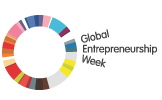Innovators will strike out time and again. But baseball—and the World Series—remind us of the value of resilience
As World Series 2009 closes out this week, we will have seen more strikeouts than home runs. But despite all the swings and misses, baseball's popularity shouldn't be surprising. Baseball embodies the idea of resilience. And resilience is exactly what the global economy needs.
Given the recession and jobless recovery, baseball reminds us to take heart. "You just can't beat the person who never gives up," Babe Ruth once said. He would know. The Babe struck out 30 times in World Series games.

 U.S. Secretary of State Hillary Clinton talks about the important role Global Entrepreneurship Week plays in fostering the ideas and innovation needed to expand human welfare.
U.S. Secretary of State Hillary Clinton talks about the important role Global Entrepreneurship Week plays in fostering the ideas and innovation needed to expand human welfare.